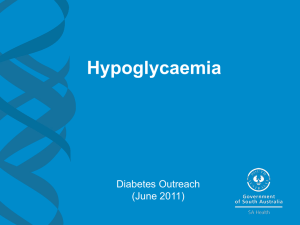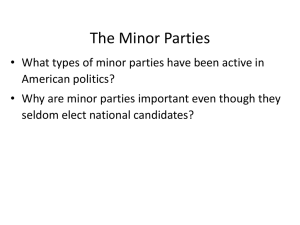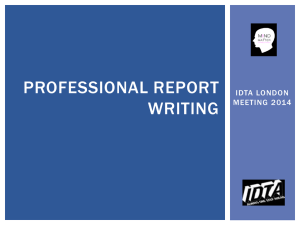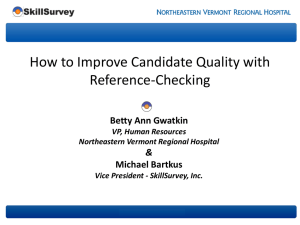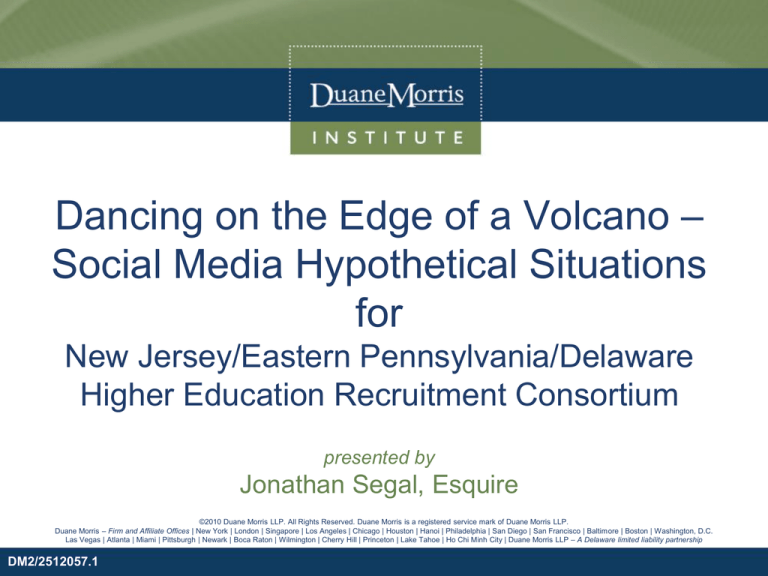
Dancing on the Edge of a Volcano –
Social Media Hypothetical Situations
for
New Jersey/Eastern Pennsylvania/Delaware
Higher Education Recruitment Consortium
presented by
Jonathan Segal, Esquire
©2010 Duane Morris LLP. All Rights Reserved. Duane Morris is a registered service mark of Duane Morris LLP.
Duane Morris – Firm and Affiliate Offices | New York | London | Singapore | Los Angeles | Chicago | Houston | Hanoi | Philadelphia | San Diego | San Francisco | Baltimore | Boston | Washington, D.C.
Las Vegas | Atlanta | Miami | Pittsburgh | Newark | Boca Raton | Wilmington | Cherry Hill | Princeton | Lake Tahoe | Ho Chi Minh City | Duane Morris LLP – A Delaware limited liability partnership
DM2/2512057.1
Hypo 1
You have interviewed 3 candidates for a
position. After the interviews, the manager for
whom you are interviewing tells you that she
does not want to consider candidate B. She
does not tell you why but the reason is
something she saw on the candidate’s social
media site.
2
Analysis of Hypo 1
Legal risk if managers do social media
checks on their own--they may not tell you
why they are rejecting a candidate and they
may reject based on protected status (e.g.,
Muslim) or protected activity (e.g., union
advocacy).
Recommend that you prohibit managers from
doing social media checks on their own.
3
Analysis of Hypo 1 (continued)
Ironically, managers may be more likely to
comply with the prohibition if they know HR is
doing some social media checks as part of its
background checks.
4
Hypo 2
You google a candidate because your gut tells
you that he is not being honest with you. You
discover that he has two convictions for
statutory rape.
5
Analysis of Hypo 2
Danger in selective “googling”—selectivity
may be seen as bias; should be uniform
policy
6
Analysis of Hypo 2
Even if uniform, don’t google in general or
review social media sites in particular as part
of initial screen; you may find out information
about disability, race, ethnicity, age, etc. that
may be seen as impermissible reason for
rejecting candidate (even when it is not the
reason).
7
Analysis of Hypo 2 (continued)
Recommend that you wait until after you
interview and are considering finalists; at this
point, you are less likely to learn EEO
information that you don’t already know
8
Analysis of Hypo 2 (continued)
If you consider criminal record based on
Internet search (or any other information not
on candidate’s own social media site), you
need to verify.
If use 3rd party to verify, you are subject to
FCRA (authorization, pre-adverse action and
adverse action) [and state laws, too].
9
Analysis of Hypo 2 (continued)
In this case, good argument that convictions
relate to suitability for job, but no guarantee
that EEOC (or state agency) would agree.
10
Hypo 3
You have been asked to look for a faculty member
in your Engineering Department. You have no
female, African American or Hispanic tenured faculty
members in the department. Your Affirmative Action
Compliance Officer recommends that you review
social media sites of potential candidates so that
you can maximize the likelihood that you will have a
diverse pool of (qualified) candidates to consider.
11
Analysis of Hypo 3
Cannot exclude individuals from
consideration based on gender, race or
ethnicity under any circumstances.
Cannot give a “plus” based on gender, race
or ethnicity, unless for “remedial purpose”
narrowly defined.
12
Analysis of Hypo 3 (continued)
Increase diversity of applicant pool by using
social media sites geared toward “diverse”
candidates.
But do not check personal social media sites
to determine diversity of candidates in
deciding whom to interview.
13
Analysis of Hypo 3 (continued)
Targeted recruiting should be at same time as
general recruiting for legal and employee
relations reasons.
14
Hypo 4
On his public Facebook page, a potential
candidate for a management position posts a
very revealing picture of himself wearing
nothing but a thin thong.
15
Analysis of Hypo 4
Obviously, highly inappropriate.
Effectiveness of candidate likely to be
compromised.
Can deny him a job.
16
Analysis of Hypo 4 (continued)
What if he were current employee?
Most probably could take adverse action —
“unprotected” posting.
17
Analysis of Hypo 4 (continued)
What if he were a union employee?
Potentially more difficult to meet “just cause”
standard because offensive/inappropriate
behavior is “off duty.”
18
Hypo 5
A female faculty member at another college
posts a notice on a public bulletin board
expressing her opinion that the college
discriminates against female faculty relative to
compensation. Can you consider this fact in
deciding whether to hire her?
19
Analysis of Hypo 5
This posting is protected by Title VII,
regardless of whether it is true.
So may be other postings that may be seen
as disparaging, for example, whistleblowers.
However, protection may be lost if false and
malicious — individual posts statistics that are
false and she knows it.
In this case, employer cannot consider
posting in deciding whether to hire her.
20
Analysis of Hypo 5 (continued)
If she were current employee, employer could
not discipline her for it (or even ask her to
remove it).
However, there may be duty to investigate the
allegations based on the knowledge.
21
Hypo 6
A faculty member who is applying for a job
posts on his blog information about a student.
He does not mention the student by name but
he disparagingly refers to “a student of
privilege” in his class who has “no clue” on how
much racial bias the generation preceding him
had to overcome.
22
Analysis of Hypo 6
Highly inappropriate.
May discourage students from
communicating openly.
If identity of individual reasonably can be
ascertained, even more problematic — abuse
of student; potential breach of agreement with
student/family; FERPA.
Legitimate reason not to hire — bad
judgment.
23
Analysis of Hypo 6 (continued)
What about academic freedom of faculty
member? Current employer’s issue; not
yours.
What if professor were your employee?
If you are a private institution, it all depends
on how you define academic freedom;
reasonably can be defined to exclude
disparaging students.
24
Analysis of Hypo 6 (continued)
If you are a public institution, First
Amendment considerations come into play.
Focus: is this matter of public interest?
25
Hypo 7
A recruiter wants to find out more about a
potential candidate. He has been told by
current employee, who is a close friend of
candidate, that the candidate has robust and
racey postings on MySpace. The recruiter
asks his 5-year old nephew to help him hack
into the candidate’s MySpace page which he
does.
26
Analysis of Hypo 7
Hacking into individual’s social media site
may give rise to liability for Intrusion Upon
Seclusion (form of invasion of privacy).
Hacking into individual’s social media site
also may violate Stored Communications Act
(part of Electronic Communications Privacy
Act).
27
Analysis of Hypo 7 (continued)
Less obvious — asking current employee for
his or her password is problematic, too —
employee may feel coerced to say yes.
If employee shares information with you
about what they have seen on someone
else’s social media site, ask them to share it
with you, but don’t ask to go into their site
with their password.
28
Hypo 8
There is a glowing article in the Chronicle
about Volcano. You post the article on
Volcano’s Facebook page so that prospective
students and employees can see it.
29
Analysis of Hypo 8
Intellectual property rights apply to social
media.
Posting an article is copying it.
If you need permission to copy, you need
permission to post.
30
Hypo 9
A male employee refers to a female colleague
as a “fat ho” on his private Facebook page. An
employee whom he has “friended” copies the
posting and shares it with the employee about
whom his friend has made the offensive
comment.
31
Analysis of Hypo 9
Social networking harassment is a real
concern.
Fact that intended to be “private” is no
defense if about employees or they become
aware of posting.
Address not only in social media policy but
also in harassment policy (and training).
32
Hypo 10
A group of students do not like a recent
transfer. They send her nasty text messages
on a regular basis. On the average day, she
receives between 10 and 20 text messages.
The text messages do not relate to her gender,
race or membership in any other protected
group. But they are mean and insulting.
33
Analysis of Hypo 10
Even if not unlawful, it is cruel and
unacceptable.
At a minimum, textual harassment should not
be permitted as matter of policy.
Address with students in orientation; consider
policy.
34
Analysis of Hypo 10 (continued)
Discuss with employees in terms of reporting
to designated person(s) knowledge of
potential textual harassment or bullying.
35
Hypo 11
You ask for information about a prospective
candidate on LinkedIn. The response you get
is glowing.
36
Analysis of Hypo 11
A reference is a reference no matter what
medium is used to convey it.
Yet, people often are willing to give
references in the context of social media that
may violate their employer’s policy.
Moreover, these informal references may not
be accurate. People think it is personal so
more likely to stretch.
37
Analysis of Hypo 11 (continued)
Dangerous to rely on social media for
reference checks. Confirm through more
traditional medium.
Now, think of your institution as the prior
employer.
Remind all employees of your policy on
references — who can give them, what can
(or cannot) be said.
Keep in mind: personal references may give
rise to personal liability.
38
Hypo 12
A recruiter for Volcano posts on her personal
blog all of the benefits of being an employee of
Volcano. She does not mention on her blog
that she is employed by Volcano.
39
Analysis of Hypo 12
FTC guidelines state that, when posting
promotional material, one must make clear
his or her association with the organization,
product or service he or she is promoting.
In this case, we have promotional activity as
defined by FTC.
If you are posting promotional material, you
must state your affiliation with your institution.
Note: same principle would apply to
recruiters for students.
40
Hypo 13
A freshman asks you to “friend” her. You say
yes and have access to her private Facebook
pages. On one of her private Facebook pages,
the student discusses the “great dope” that she
has smoked.
41
Analysis of Hypo 13
Risk in “friending” students — you may
discover what you really don’t want to know;
plus, the professional lines may blur.
Do you have an obligation to do anything?
Are you condoning the behavior if you say
nothing?
Probably not a legal obligation but parents
and media may not see it that way if
discovered later.
42
Analysis of Hypo 13 (continued)
Be aware of risks.
Organizations may wish to consider
restrictions.
43
Hypo 14
A recruiter and her administrative assistant
develop a social media friendship. The
recruiter is given access to the subordinate’s
personal pages and learns that the subordinate
is a recovering alcoholic. Later, she disciplines
the subordinate.
44
Analysis of Hypo 14
Risk in “friending” subordinate, too. In
addition to blurring the lines of the
relationship, you may discover EEO
information about employee you are better off
not knowing.
Employee later may claim that the information
was considered in making adverse
employment action.
45
Analysis of Hypo 14 (continued)
Risk particularly high for HR, which may play
some role in most material adverse
employment decisions.
At a minimum, be aware of risks.
Organizations may wish to consider
restrictions.
If restrictions, distinctions between
professional and personal social media.
46
Thank you!
©2010 Duane Morris LLP. All Rights Reserved. Duane Morris is a registered service mark of Duane Morris LLP.
Duane Morris – Firm and Affiliate Offices | New York | London | Singapore | Los Angeles | Chicago | Houston | Hanoi | Philadelphia | San Diego | San Francisco | Baltimore | Boston | Washington, D.C.
Las Vegas | Atlanta | Miami | Pittsburgh | Newark | Boca Raton | Wilmington | Cherry Hill | Princeton | Lake Tahoe | Ho Chi Minh City | Duane Morris LLP – A Delaware limited liability partnership

